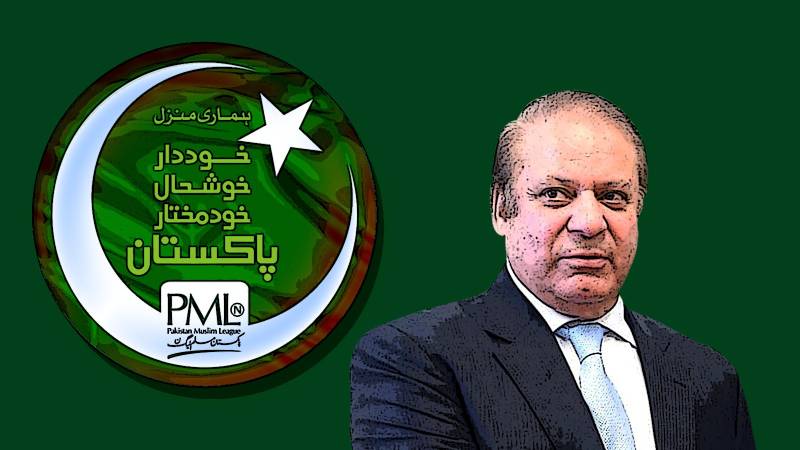
If there were a Nobel Prize recognizing the art of being a "periodic revolutionary" on the global stage, Nawaz Sharif would undeniably emerge as a leading contender. His remarkable ability to swiftly adapt and pivot within the realm of politics is nothing short of astonishing. Sharif's political journey is a rollercoaster of shifting allegiances and dynamic stances that have left observers both bewildered and intrigued.
One moment, Sharif thunders with accusations, vehemently asserting that General Qamar Javid Bajwa and General Faiz Hameed must be held accountable for their actions. Yet, in the very next breath, he undergoes a transformation, assuming an aura of magnanimity and forgiveness. He declares, almost benevolently, that for the greater good of the nation and the sanctity of democracy, he extends his forgiveness to them.
This ability to oscillate between fiery condemnation and a conciliatory tone within the span of mere days is a testament to Nawaz Sharif's political dexterity. It leaves one pondering whether this oscillation is a calculated move, a strategic dance in the intricate choreography of Pakistan's political landscape, or a genuine reflection of his belief in the importance of national unity and stability.
Sharif's capacity to traverse this pendulum of rhetoric places him squarely in the league of those who possess an uncanny talent for reinventing themselves when the political winds change direction. It is this remarkable adaptability, this propensity to embody the role of both the challenger and the reconciler, that defines Nawaz Sharif's legacy as a periodic revolutionary on the global stage.
One moment, Sharif thunders with accusations, vehemently asserting that General Qamar Javid Bajwa and General Faiz Hameed must be held accountable for their actions. Yet, in the very next breath, he undergoes a transformation, assuming an aura of magnanimity and forgiveness.
Nawaz Sharif's propensity for strategic political maneuvering and rapid shifts in position is hardly a recent development. It's a trait that has characterized his career for quite some time, demonstrating a knack for adaptability that few can match.
One prominent instance of this adaptability occurred when he was ousted from power by the Supreme Court. In the aftermath, he emerged as a stalwart champion of democracy, rallying the masses with the resounding slogan, 'Vote Ko Izzat Do' – demanding the utmost respect for the power of the vote. His impassioned rhetoric portrayed him as a defender of democratic principles, an icon of resistance against perceived injustice.
Yet, the narrative took a dramatic twist when Sharif found himself embroiled in the infamous Panama scandal case, resulting in a court-ordered sentence. It was during this turbulent period that he orchestrated a strategic realignment, striking a behind-the-scenes deal with the establishment. This move led him to the opulent comfort of his luxurious Mayfair apartments, a world away from the fervent streets of political activism.
In this plush haven, he seemed to tuck away his revolutionary zeal beneath the expensive carpets of his apartment, his rhetoric now replaced by a quiet pragmatism. However, Sharif's political acumen was far from dormant. When the opportune moment presented itself, he was quick to pivot yet again.
In a heartbeat, he directed his political party to vote in favor of the extension of General Bajwa's tenure, the very same military leader he now seeks to hold accountable. This stunning about-face, from a silent understanding with the establishment to an unapologetic stance against it, is a testament to Sharif's remarkable political agility.
Nawaz Sharif's political journey is a narrative woven with threads of adaptability and pragmatism. Throughout his career, he has skillfully cast himself alternately as a steadfast champion of democracy and as a leader willing to accommodate the military's interests when it suits his objectives. This ability to seamlessly transition between these roles has divided opinion about his true character and intentions.
Nawaz Sharif has exhibited a readiness over the years to engage in undemocratic actions, exemplified by his role in the Memogate scandal and his recent alliance with forces that do not adhere to democratic principles, all in the pursuit of his personal interests, even at the expense of the national interest.
To some, he appears as a shrewd and pragmatic politician adept at navigating the perilous waters of Pakistani politics. These observers see Sharif as a leader who prioritizes his own interests and those of his family above the welfare of the nation. His actions, they argue, consistently reflect a willingness to make strategic concessions and shifts in position, as exemplified by his famous line, 'I will not take dictation,' or his rallying cry of 'Vote Ko Izzat Do.'
In this view, Sharif is seen as a politician devoid of unwavering principles, capable of altering his stance to align with the prevailing political climate and serve his personal agenda. His track record suggests that, for him, personal and familial interests often eclipse the broader interests of the country, leading to a perception of opportunism rather than steadfast conviction. Nawaz Sharif has exhibited a readiness over the years to engage in undemocratic actions, exemplified by his role in the Memogate scandal and his recent alliance with forces that do not adhere to democratic principles, all in the pursuit of his personal interests, even at the expense of the national interest.
In essence, Nawaz Sharif's political trajectory is marked by a fluidity that has allowed him to pivot, adapt, and recalibrate his positions as the situation demands. Whether one views this as pragmatism or as a lack of principled leadership largely depends on one's perspective and interpretation of his actions. Sharif's legacy is thus a complex tapestry of political maneuvers that continues to shape perceptions and debates within the intricate landscape of Pakistani politics.

